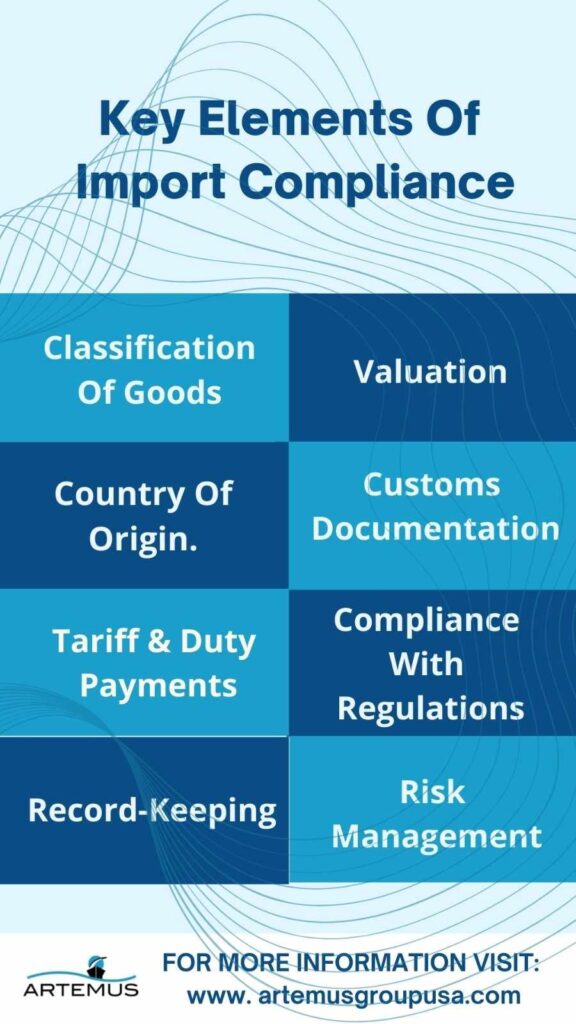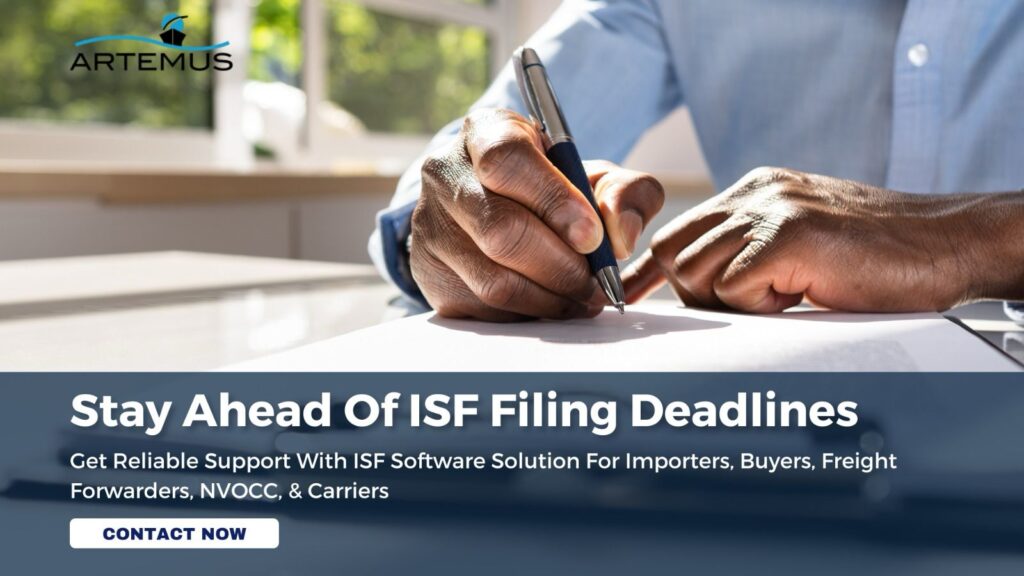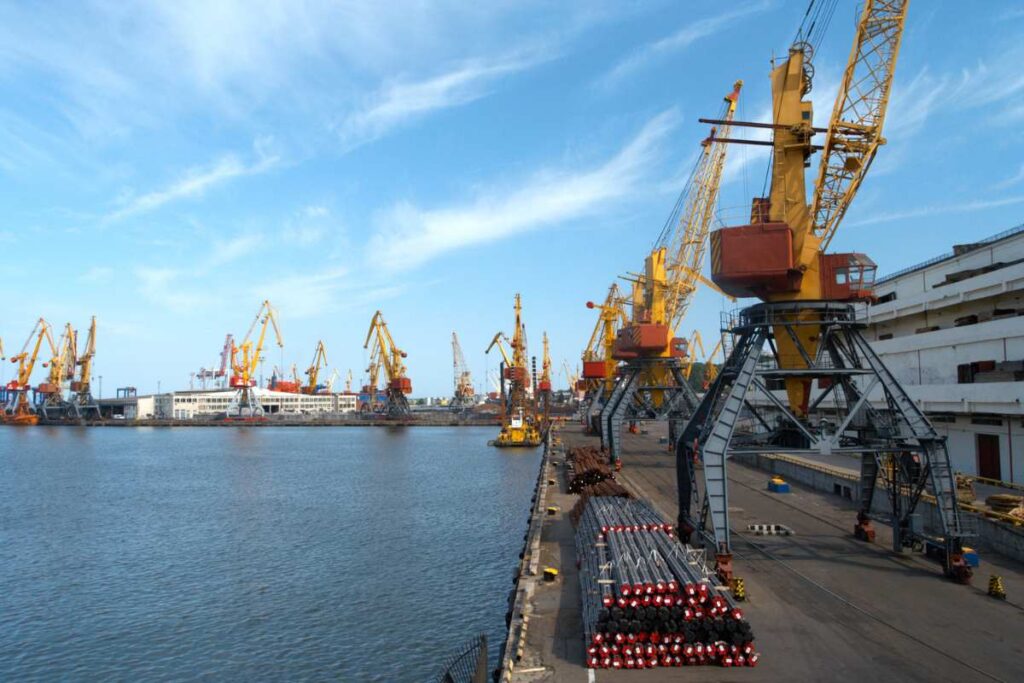
What Is Inbound Logistics & Outbound Logistics? A 2025 Guide
In the dynamic world of supply chain management, understanding the nuances of inbound and outbound logistics is crucial for operational

In the fast-paced world of global trade, import compliance is more crucial than ever. Adhering to the regulations and requirements set forth by customs authorities ensures that your goods can enter the market without unnecessary delays, fines, or legal complications.
Import compliance involves a thorough understanding of documentation, classification, valuation, and adherence to trade agreements, which can be complex and ever-changing.
Artemus Transportation Solutions is here to help you navigate these complexities with ease. We offer cutting-edge software for Importer Security Filing (ISF) and Automated Manifest System (AMS) filings, ensuring your shipments are always in line with USA compliance standards.
Our comprehensive customs broker software further simplifies the import process, providing a seamless experience from shipment to clearance. With Artemus Transportation Solutions, you can be confident in maintaining full compliance and efficiency in your import operations.
Table Of Contents
Import compliance refers to the adherence to laws and regulations governing the importation of goods into a country. It encompasses various aspects, including customs regulations, trade laws, tariffs, and documentation requirements, all aimed at ensuring the legality, safety, and proper taxation of imported goods.
Compliance with these regulations is crucial for businesses involved in international trade to avoid penalties, delays in customs clearance, and potential reputational damage.
Key elements of import compliance include accurate classification of goods, proper valuation, adherence to import quotas and licensing requirements, and the timely submission of required documentation to customs authorities.
By prioritizing import compliance, businesses can streamline their import processes, mitigate risks, and maintain smooth operations across borders.
Related: OTI License Requirements, Costs, Renewal, & Regulations
Trade compliance refers to the adherence to regulations and laws that govern the movement of goods and services across international borders. It encompasses a broad spectrum of rules, including import and export regulations, trade sanctions, embargoes, customs procedures, and documentation requirements.
The primary goal of trade compliance is to ensure that businesses conduct their cross-border activities in accordance with legal standards set by national and international authorities.
This compliance helps to mitigate risks such as fines, penalties, and restrictions on trading activities, while also promoting fair trade practices and national security interests.
Key aspects of trade compliance include accurate classification and valuation of goods, adherence to licensing and permit requirements, compliance with trade agreements and treaties, and maintaining records that demonstrate adherence to regulatory requirements.
By prioritizing trade compliance, businesses can enhance their global competitiveness, mitigate legal risks, and foster sustainable international trade relationships.
From: New Trade Rules and Import Compliance Trends on the E-Commerce Horizon
E-commerce growth is prompting new trade and import compliance trends. Key trends include increased regulatory scrutiny, the need for robust supply chain visibility, and greater emphasis on sustainability and ethical sourcing.
Companies are advised to enhance their compliance frameworks to address these challenges, incorporating advanced technologies like AI and blockchain for better tracking and transparency. Effective data management and proactive engagement with regulatory changes are essential for maintaining compliance in the evolving e-commerce landscape.
Related: Customs Compliance Software: Key Benefits & Top Suggestions

Here are the key elements of import compliance:
Related: What Does Customs Clearance Completed Mean? Key Takeaways
The country of origin refers to the country where a product was manufactured, produced, or grown. It is a key element in international trade that affects tariff rates, trade restrictions, and compliance with various regulations.
Determining the correct country of origin involves understanding the product’s production process and where significant transformation occurred. Accurate identification is crucial for customs declarations, labeling, and adhering to trade agreements.
Related: Custom Clearance Charges & Fees: A Complete Guide
Import compliance is primarily the responsibility of the importer of record. This entity, whether an individual or company, must ensure that all imported goods meet U.S. laws and regulations. Responsibilities include accurate documentation, proper tariff classification, valuation, and adherence to product safety standards.
The importer must also ensure payment of duties and taxes and maintain compliance with trade agreements. U.S. Customs and Border Protection (CBP) enforces these regulations, and failure to comply can result in penalties, fines, and shipment delays.
Related: Custom Clearance Documents Required In USA, India, & Japan
In the USA, trade compliance is stringently monitored to prevent illegal activities and ensure national security. Key aspects include:
The U.S. Customs and Border Protection (CBP) plays a crucial role in trade compliance. The CBP enforces regulations to secure and facilitate imports arriving in the United States. Key functions include:
Related: Can A Customs Broker Be The Importer Of Record Legally?
Understanding tariff classifications and duty rates is essential for businesses engaged in international trade to accurately calculate and anticipate costs associated with importing and exporting goods.
Here’s an overview based on reliable sources:
Tariff Classifications: Tariff classifications refer to the systematic classification of goods for customs purposes. Each country uses a harmonized system of tariff classification, typically based on the Harmonized Commodity Description and Coding System (HS). The HS system assigns a unique code to each type of product, providing a standardized method for identifying goods traded internationally.
Duty Rates: Duty rates, also known as customs duties or tariffs, are taxes imposed on imported or exported goods. These rates are determined based on the HS classification of the goods and are applied as a percentage of the goods’ declared value (ad valorem duty) or based on quantity or weight.
Understanding tariff classifications and duty rates enables businesses to:
By leveraging accurate classification and understanding duty rates, businesses can navigate international trade complexities effectively, optimize supply chain management, and enhance profitability in global markets.
Related: Customs Bond Renewal: All Facts You Need To Know
Ensuring successful import compliance is crucial for businesses engaged in international trade to navigate regulatory requirements and avoid costly penalties. Here are five best practices based on industry recommendations and expert advice:
By implementing these best practices, businesses can enhance import compliance efforts, minimize operational disruptions, and build a reputation for reliability and adherence to regulatory standards in global trade environments. This proactive approach not only mitigates legal risks but also fosters sustainable growth and competitiveness in international markets.
Related: When Is A Customs Bond Required? Key Factors To Consider

Navigating the complex landscape of international shipping regulations can be daunting, but Artemus Transportation Solutions is here to simplify the process. The comprehensive suite of compliance support tools ensures that your Importer Security Filing (ISF) and Automated Manifest System (AMS) filings are handled precisely and efficiently.
The advanced software solutions streamline the submission process, helping you meet all regulatory requirements effortlessly and avoid costly delays or penalties.
With Artemus Transportation Solutions, you can be confident that your shipments always comply with U.S. Customs and Border Protection (CBP) regulations.
Artemus’ user-friendly platforms are designed to integrate seamlessly into your existing logistics operations, providing real-time updates and comprehensive support. Trust Artemus to keep your business on course, ensuring that your goods move smoothly across borders while maintaining the highest compliance standards.
Related: What Is Customs Clearance? Meaning & Regulations
Import compliance refers to the adherence to laws, regulations, and procedures governing the entry of goods into a country, ensuring legal, secure, and efficient importation while minimizing risks and penalties.
Trade compliance refers to the adherence to regulations, laws, and policies that govern international trade activities, ensuring businesses operate legally, ethically, and in accordance with global trade standards to mitigate risks and maintain competitiveness.

In conclusion, import compliance stands as a cornerstone of successful international trade operations. It encompasses the meticulous adherence to regulations, accurate classification of goods, and timely submission of documentation necessary for smooth customs clearance.
At its core, import compliance not only ensures legal conformity but also fosters operational efficiency and mitigates risks associated with penalties and delays.
By prioritizing compliance, businesses not only navigate the complexities of global trade effectively but also build trust with stakeholders and enhance their competitive edge in the international marketplace.
As regulations evolve, staying proactive and informed remains crucial, empowering businesses to seize opportunities and sustain growth while safeguarding against regulatory pitfalls.
Related: How To Do Custom Clearance In USA For Goods? The Process

In the dynamic world of supply chain management, understanding the nuances of inbound and outbound logistics is crucial for operational

In today’s interconnected world, businesses rely heavily on global trade to expand their markets, access new resources, and drive growth.

Importing goods for resale in the USA presents a lucrative business opportunity, but navigating the complexities of U.S. customs regulations,
Get In Touch
Artemus’ Software Solutions for ISF, AMS, Japan AFR, eManifest Canada, & Panama B2B filings.